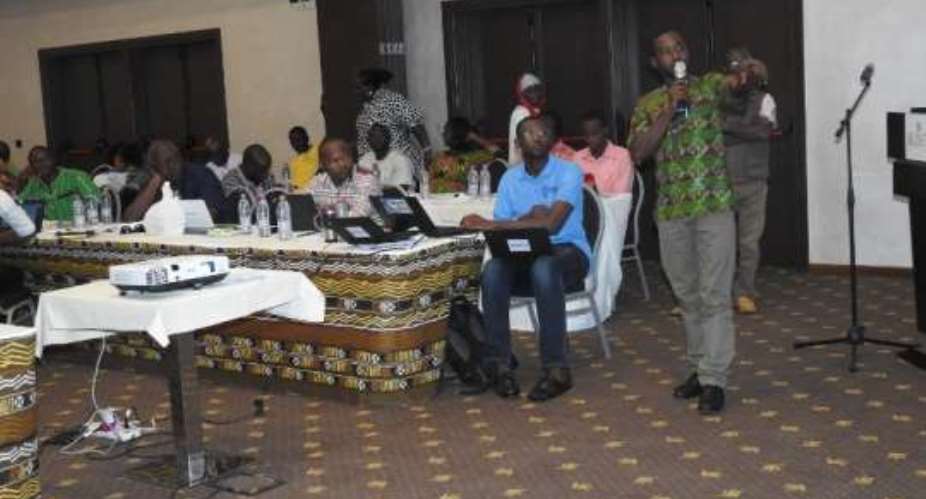Bolgatanga, June 24, GNA - The Upper East Regional Coordinating Council (UERCC) has expressed optimism that the Northern Ghana Governance Activity (NGGA) Projects being implemented in the Northern, Upper East and Upper West Regions would help turn the fortunes of the agriculture sector in the areas.
The five-year project, which has already started is being funded by the United States Agency for International Development (USAID) and has the goal of strengthening responsive governance for improved agriculture development in 28 Metropolitan, Municipal and District Assemblies (MMDAs) in the aforementioned Regions of Ghana.
The Upper East Regional Coordinating Director, Alhaji Abdulai Abubakar, expressed the optimism during a Multi-stakeholder Consultation forum on District Agricultural Governance Index, organized by the NGGA in Bolgatanga on Thursday.
It was aimed at ensuring that the various Municipal and District Assemblies including the Bolgatanga Municipal, Kassena-Nankana Municipal, Nabdam, and Talensi Districts among others developed standard Agricultural Governance Index that would be used as benchmarks to determine how responsive they were to the agriculture sector.
The Regional Coordinating Director blamed the poor performance of the agricultural sector in these areas to weak agricultural governance systems at the various MMDAs and stated that both structures and programmes relating to agricultural policies were uncoordinated and disjointed.
This, he stressed, made it difficult for concrete agricultural policies and programmes to be worked through the Assembly sub-structures from the Town, Area and Zonal Councils to MMDAs Medium Term Development for discussions and effective implementation.
He stated that the RCC had no doubt that the NGGA which had among its ambit to strengthen institutional capacity for effective coordination and integration of key actors in the decentralization and development of agriculture to create enabling environment for community organizations, Civil Society Organisations (CSOs) and the private sector to participate.
He noted that the NGGA's activities would improve agricultural development, enhance women's participation in local governance and increase access to agricultural information and opportunities as well as increase community dialogue and consensus building to prevent conflict and ensure sustainable development in the sector to boost agriculture production in the area.
'We have the fullest conviction and belief that with credible Non-Governmental Organizations like CARE International in Ghana (CARE), Action Aid Ghana (AAG), SEND-Ghana and the West Africa Network for Peace-building, Ghana (WANEP-Ghana) involved in the implementation process, the project will achieve greater success'
The Regional Coordinating Director mentioned male domination of the agriculture sector, conflicts on agricultural lands, issues of estate developers, competition between agricultural development and land forestation, conflict between land for crops and land for grazing as some of the major problems confronting the agricultural sector, and entreated the project to help address these challenges.
Mr Frederick Adimazoya, the Regional Monitoring and Evaluation Officer at the NGGA, said the project was determined to achieve set targets and added that it was already engaging some MMDAs to ensure that they placed premium on agricultural governance in their Medium Term Development Goals.
'The project has also formed Civil Society Platforms, Women in Agriculture platforms, and held considerable number of consultative meetings with major stakeholders, communities in the project implementation areas including today's Multi-stakeholder Consultation forum on District Agricultural Governance Index', he stated.
Mr Thomas Ayamga, the Monitoring and Evaluation Specialist also at the NGGA, facilitated the Multi-stakeholder Consultation on District Agricultural Governance Index which attracted District Directors of the MOFA, Planning Officers at the District Assemblies, Senior Staff at the Regional Coordinating Council, Gender Officers, Media practitioners, CSOs, and Women platforms in Agriculture.
He stated that the already developed Agricultural Governance Index would be used as a benchmark to determine a District's responsiveness to agriculture and how it could attract development partners for effective collaboration to improve the agriculture sector. GNA
By Samuel Akapule, GNA





 There’s nothing you can do for us; just give us electricity to save our collapsi...
There’s nothing you can do for us; just give us electricity to save our collapsi...
 Ghanaian media failing in watchdog duties — Sulemana Braimah
Ghanaian media failing in watchdog duties — Sulemana Braimah
 On any scale, Mahama can't match Bawumia — NPP Youth Organiser
On any scale, Mahama can't match Bawumia — NPP Youth Organiser
 Never tag me as an NPP pastor; I'm 'pained' the 'Akyem Mafia' are still in charg...
Never tag me as an NPP pastor; I'm 'pained' the 'Akyem Mafia' are still in charg...
 Your refusal to dedicate a project to Atta Mills means you never loved him — Kok...
Your refusal to dedicate a project to Atta Mills means you never loved him — Kok...
 2024 elections: I'm competent, not just a dreamer; vote for me — Alan
2024 elections: I'm competent, not just a dreamer; vote for me — Alan
 2024 elections: Forget NPP, NDC; I've the Holy Spirit backing me and nothing wil...
2024 elections: Forget NPP, NDC; I've the Holy Spirit backing me and nothing wil...
 2024 elections: We've no trust in judiciary; we'll ensure ballots are well secur...
2024 elections: We've no trust in judiciary; we'll ensure ballots are well secur...
 Performance tracker: Fire MCEs, DCEs who document Mahama's projects; they're not...
Performance tracker: Fire MCEs, DCEs who document Mahama's projects; they're not...
 Train crash: Railway ministry shares footage of incident
Train crash: Railway ministry shares footage of incident
